Author Jochen Menner, Curator of Birds Taman Safari 2/ Prigen Conservation Breeding Ark
The PCBA was established in 2017 to serve as a breeding facility for the most endangered Indonesian species, the main focus is on songbirds. The centre is located within the grounds of Taman Safari 2, Prigen in East Java, it operates as a joint effort of Taman Safari, EAZA institutions and the ZGAP.
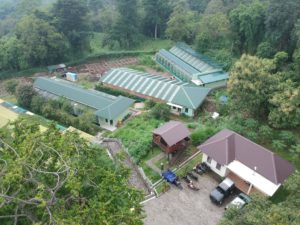
Construction updates
By January 2020 we were able to complete the construction of the fourth songbird breeding complex, consisting of 22 aviaries. 11 of them measuring 2.5m/2.5m/3m the others 7m/2.5m/5m. The smaller aviaries are currently accommodating a group of 10 (5.5) Javan Pied Starlings (Gracupica jalla) which we are keeping as a colony to decrease the problem of partner aggression. The remaining 6 smaller aviaries are used for Leafbirds (Chloropsis sonnerati and C. cochinchinensis), currently being housed individually in the hope to achieve proper breeding condition.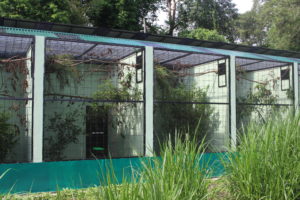
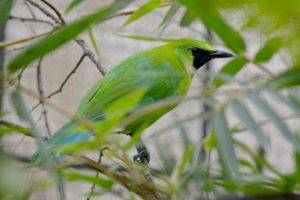 Leafbird aviaries in complex 4. Photo PCBA Male Javan Leafbird in PCBA. Photo Roland Wirth
Leafbird aviaries in complex 4. Photo PCBA Male Javan Leafbird in PCBA. Photo Roland Wirth
The 11 larger aviaries are used to house our most sensitive pairs of larger species. For example, we are keeping Javan Crested Jay (Platylophus galericulatus garlericulatus), Rufous fronted Laughingthrush (Garrulax rufifrons rufifrons), Nias Hill Myna (Gracula robusta) and Nusa Tenggara Hill Myna (Gracula venerata) there.
With the completion of unit 4 the PCBA now consists of 121 songbird aviaries housing 24 species. In January the construction of the units 5 and 6 started and is progressing very fast, so that the completion by May seems doable. These 2 units will consist of an additional 62 aviaries with the dimensions of 3m/1.5m/3m and will be used to breed smaller and medium sized songbird species. All aviaries will be equipped with connecting slidedoors to give us the chance to connect and separate flexibly.
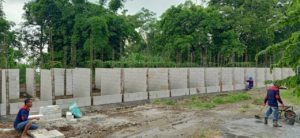 Construction on complex 6 in February 2020. Photo PCBA
Construction on complex 6 in February 2020. Photo PCBA
Important recent breeding results
Within the last 6 months we managed to breed 10 threatened Songbird species. The most remarkable amongst those might be Wangi-Wangi White-eye (Zosterops sp.) and Maratua Shama (Kittacincla malabarica barbouri). Both taxa seem to be kept worldwide in no other institution and are of highest conservation priority.
The Wangi-Wangi White-eye is endemic to Wangi-Wangi island in the Tukang Besi archipelago, with its naturally very small distributions its vulnerable to any kind of disruption. Recently a massive increase of tourism activities has taken place on Wangi-Wangi, so a lot of suitable habitat might be lost but an even bigger threat poses the poaching for the cagebird trade. This White-eye was virtually unknown in the trade until relatively recently but with more and more Javanese workers coming to Wangi-Wangi, the species is now occurring in bigger numbers in the Javan and Balinese trade.
So far, we managed to breed with 2 pairs while 2 more are building nests, these first promising attempts will hopefully be the foundation of a successful conservation program and valuable knowledge for .
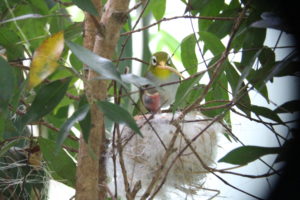 Wangi-Wangi White-eye with the very first chick. Photo PCBA
Wangi-Wangi White-eye with the very first chick. Photo PCBA
Even more dire seems to be the situation for the Maratua Shama, endemic to Maratua island off the eastern coast of Borneo it hasn’t been seen on the island since 2011 and might very well be extinct in the wild.
Within the last 18 months we managed to secure 8 individuals of which 1 died, the remaining 7 turned out to be 1.6 and might have represented the largest part of the global population by then. Since about 6 months no Maratua Shamas have been offered in the online trade, indicating that we may have managed to get hold of some of the very last survivors.
Between October 2019 and January 2020 in total 7 Maratua Shama chicks hatched at the PCBA, 6 of them are still alive, bringing our small population to 4.9.
In January we paired our only adult male with a second female, to get as many founders involved as soon as possible. This new pair immediately produced its first clutch and successfully raised 2 chicks.
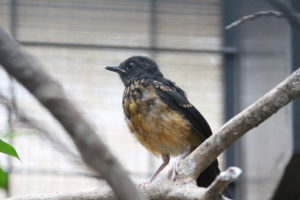
The first (likely extinct in the wild) Maratua shama hatched at the PCBA. Photo PCBA
